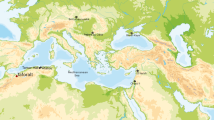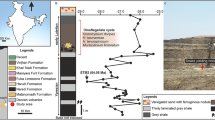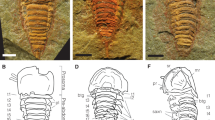Abstract
THIS communication reports the finding of fragmentary remains of Devonian fishes from India. They were collected by one of us (V. J. G.) in situ near Margan Pass (33° 44′ N., 75° 32′ E.) in the Anantnag District of Kashmir, India. They were discovered in dark, calcareous shales that overlie the fossiliferous Naubug Beds and underlie the Muth Quart zite, which is exposed on the talus-covered slopes south-west of Mangan. The former are of Upper Silurian age, while the Muth Quartzite near Naubug has been assigned to the Middle Devonian.
This is a preview of subscription content, access via your institution
Access options
Subscribe to this journal
Receive 51 print issues and online access
$199.00 per year
only $3.90 per issue
Buy this article
- Purchase on Springer Link
- Instant access to full article PDF
Prices may be subject to local taxes which are calculated during checkout
Similar content being viewed by others
References
White, E. I., Bull. Brit. Mus. (Nat. Hist.), Geol., 11, No.1, 7 (1965).
Author information
Authors and Affiliations
Rights and permissions
About this article
Cite this article
GUPTA, V., DENISON, R. Devonian Fishes from Kashmir, India. Nature 211, 177–178 (1966). https://doi.org/10.1038/211177a0
Issue Date:
DOI: https://doi.org/10.1038/211177a0
This article is cited by
-
Ordovician Graptolites from the Kashmir Himalayas
Nature (1967)
-
Devonian Conodonts from Kashmir
Nature (1967)
Comments
By submitting a comment you agree to abide by our Terms and Community Guidelines. If you find something abusive or that does not comply with our terms or guidelines please flag it as inappropriate.



